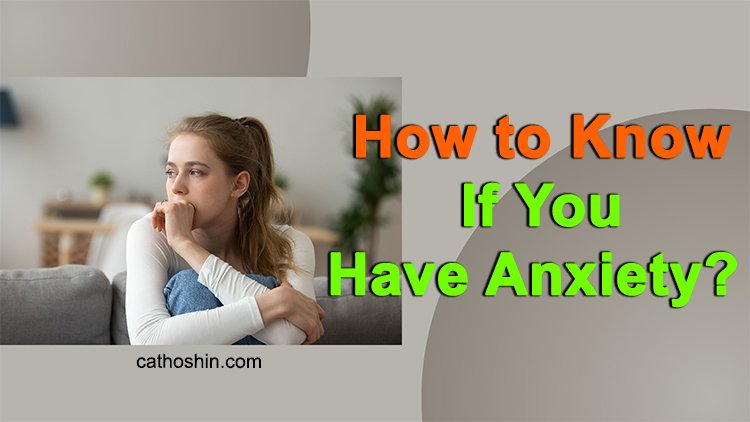How to Know If You Have Anxiety? (Check out 10 Signs HERE)
Almost everyone has their own worries.
However, when you experience the anxiety frequently and intensely, it will soon take over your life and eventually develop an anxiety disorder. Anxiety is a term indicating the emotional states, such as fear, doubt, disappointment, and stress.
It’s quite complicated to differentiate between normal anxiety and anxiety disorder.
How to know if you have anxiety seriously?
Table of Contents
10 Signs Telling You Have an Anxiety Disorder

The cause of anxiety disorders is unknown, but experts believe that they can be the result of many different reasons:
1. Excessively worry
This is the first and most prominent sign of an anxiety disorder. You seem to worry too much about almost everything, no matter how big or small it is. If this occurs every day in 6 months, you’re having severe anxiety.
Being excessively anxious can affect your daily life and cause physical symptoms such as fatigue. When suffering from an anxiety disorder, you will feel much more distressful and exhausted.
See also: Helping someone with anxiety and depression
2. Overly thinking
If you’re unable to stop thinking about work, finances, and other matters for days, weeks or even months, this means you’re letting stress swallow you and control your life. As soon as you are taken over by your anxiety, you will have to deal with different psychological problems damaging the body.
3. Sleeping issues
Sleeping difficulty has nothing to do with a person’s physical, mental, or health conditions. However, if you regularly have problems sleeping and feel anxious every night, it can be considered as a sign of an anxiety disorder.
In addition, when having anxiety, you will also feel unnerved and easily lose your temper every time waking up in the morning.
4. Fear
We are all afraid of something in life, like fear of insects, heights, crowds, etc. But, again, if that fear keeps growing inside you and becomes a trauma to you, it’s believed to be a sign of anxiety disorder.
The difficulty of this symptom is that it is hard to spot. Usually, we have to confront our fear so that we can realize what we are actually afraid of.
5. Muscle tension
Constant muscle tension throughout the body is often related to an anxiety disorder. This symptom is so persistent that people who live with it for a long time may get used to it after a while.
Regular exercise helps manage muscle tension but also triggers the pain if there’s an injury or unexpected situation disrupting your routine. The consequences of that are not only muscle tension but also restlessness, anxiety, and irritability.
Read more: What triggers emotional attraction in a man?
6. Fear of crowd
Many people need to stand in front of the crowd when performing, giving a presentation, or holding a meeting. Getting all the attention in these events is normal. But, if the fear is too big to the point that no practice or effort can lessen it, you may be dealing with social anxiety disorder (also known as social phobia).
People with social anxiety tend to worry for days or weeks, making them unable to stand in front of crowds. Or if they manage to get through it, they will tend to get upset and struggle with themselves for a long time every time thinking about that moment.
7. Afraid of communicating
Social anxiety disorder doesn’t have to involve in public speaking or being the center of attention all the time. In fact, anxiety can show up in casual conversations, or when you have meals in front of some people.
In these situations, people with anxiety disorders will feel like all the eyes are on them and often find themselves uneasy. They also feel shaky, nauseous, sweaty, or have trouble talking.
These symptoms make it difficult to meet new people, maintain relationships, and get promotion in work.
8. Panic attacks
Panic attacks are scary.
When you’re panic, the feeling of fear and helplessness will come all of sudden and last for several minutes, accompanied by other symptoms: shortness of breath, heart beating fast or aching, sweaty hands, numbness, dizziness, chest pain, stomachache, as well as hot or cold.
Not everyone having panic attacks will have an anxiety disorder. However, if you experience them frequently, you probably have anxiety. People with this disorder are likely to live in fear and often worry about their next panic.
9. Flashbacks of trauma
If you have frequent flashbacks of traumatic events, such as an accident or the loss of a loved one, it’s seen as a sign of post-traumatic stress disorder (PTSD).
Some people with anxiety also experience the same situation. For example, you often recall yourself being ridiculed, laughed at, scolded, or slandered. The best way to avoid this is to fill your mind with only positive thoughts and stay around good people.
10. Self-doubting
Constant self-doubt is one of the common signs of an anxiety disorder. These kinds of questions are always bugging your mind anytime you want to do something, such as: "Can I do it?" "How can a person like me do that?" "Whatever, I know it’s gonna be a failure anyway."
When you don’t have uncertain answers, the feeling of having no confidence in your abilities and decisions will make you stress and get worse as days go by.
The Bottom Line
So, these are signs of how to know if you have anxiety!
Is there anything to treat anxiety disorders?
If you are having anxiety, try to…
- Change your lifestyle
- Talk with a therapist about anxiety disorders
- Have medicine
According to experts, anxiety disorders can be recovered with effective methods at the right time. Otherwise, if not treated properly, they will become a chronic disease or keep relapsing. Anxiety can affect one’s ability to work, study, health, and participate in other activities.
To stop or prevent anxiety, you should change your perception and behavior.
For more info, leave your comment in the below.





Leave a Reply